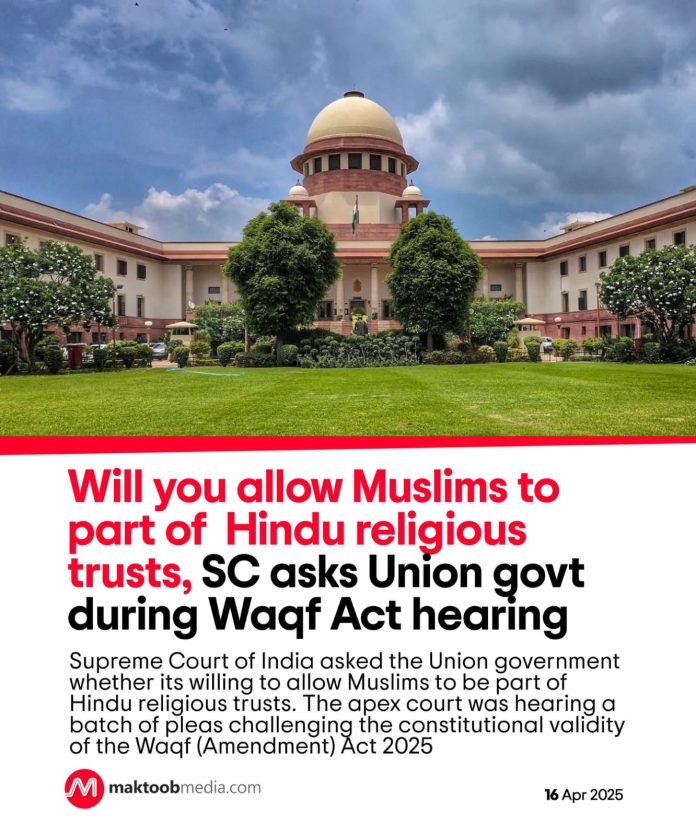In a pivotal development, the Supreme Court of India today, indicated that it may soon issue an interim order concerning the contentious Waqf (Amendment) Act, 2025. The move comes amid mounting legal and constitutional concerns raised by members of the Muslim community and senior advocates. The bench acknowledged the potential violation of religious freedoms and flagged provisions in the law that could drastically impact centuries-old religious properties and community-run endowments.
A three-judge bench led by Chief Justice Sanjiv Khanna, and comprising Justices Sanjay Kumar and KV Viswanathan, conducted an extensive hearing that lasted over two hours. The matter has been adjourned for further deliberation on Thursday at 2 PM, during which the court is expected to finalize its interim directions.
Court’s Proposed Interim Directions
The bench suggested several interim measures aimed at preserving the sanctity and status of Waqf properties and protecting the rights of the Muslim community:
- Properties declared as Waqf by courts—whether through user or documentation—should not be de-notified while legal proceedings are pending.
- The controversial proviso to Section 2A, which allows exclusion of Waqf properties during a Collector’s inquiry into state ownership, should not be implemented.
- Membership of Central and State Waqf Boards must remain limited to Muslims, except for ex-officio members.
“Our interim order will balance equities,” said Chief Justice Khanna. “Properties declared waqf by court—whether by user or otherwise—will not be de-notified or treated as non-waqf.”
Petitioners Challenge the Act as an Assault on Islamic Faith
Appearing on behalf of the petitioners, Senior Advocate Kapil Sibal argued that the Waqf (Amendment) Act 2025 infringes upon the religious freedoms guaranteed under Article 26 of the Constitution, which ensures the rights of religious denominations to manage their own affairs.
He criticized several key provisions of the Act:
- Section 3(r): Mandates that a person must prove adherence to Islam for at least five years and prove that a dedication is not a “contrivance.”
- Section 3C: Allows government officers to unilaterally declare any land as not Waqf and decide disputes internally.
- Section 3D: Bars Waqf claims on properties classified as protected monuments.
- Section 3E: Prohibits creation of Waqf on tribal lands.
- Sections 9 & 14: Permit inclusion of non-Muslims in Waqf Boards and the Central Waqf Council.
“If I am born a Muslim, why should I have to prove my belief to the State to create a waqf?” questioned Sibal. “Who is the State to intrude into the realm of personal faith?”
He particularly raised alarm over the removal of the long-standing principle of waqf-by-user, where continued religious use qualifies a property as waqf. According to him, nearly half of India’s estimated 8 lakh waqf properties rely on this principle. “With a single amendment, you are erasing centuries-old religious establishments,” he said, warning of irreversible damage to community heritage.
Judiciary Questions the Government’s Justifications
The bench did not shy away from grilling the Union Government, represented by Solicitor General Tushar Mehta, who defended the amendments. The court asked pointed questions about the practicality of registering waqf-by-user properties, especially those with origins dating back centuries.
“How will you register a waqf-by-user from 300 years ago?” asked Chief Justice Khanna, highlighting the near impossibility of meeting documentation standards for historical properties.
Justice Viswanathan drew a comparison to the Hindu Religious and Charitable Endowments Act, which allows only Hindus to manage Hindu religious trusts. “Why should Waqf Boards be any different?” he asked, criticizing provisions that allow non-Muslims to interfere in Muslim religious institutions.
Justice Viswanathan noted that the Hindu Charitable Endowments Act mandates Hindus to manage Hindu trusts and questioned why the same principle should not apply to Waqf Boards.
The court also expressed dissatisfaction with the clause that denies waqf status to a property until a government officer concludes an inquiry. “Let the civil courts decide,” said the Chief Justice, signaling a preference for judicial oversight rather than administrative control.
Support from Other Senior Lawyers
Senior Advocates A.M. Singhvi, Rajeev Dhavan, Sanjay Hegde, and CU Singh backed the petitioners and emphasized the religious and social significance of Waqf in Islam. They reiterated that charity and endowment are integral to the faith, and Waqf institutions are vital for community welfare.
Singhvi stated that deleting waqf-by-user risks invalidating nearly 4 lakh existing waqf properties and called some provisions “pernicious.” He urged the court to immediately stay the operation of the amendment.
Sanjay Hegde drew parallels with the Sikh community’s resistance to government interference through the Akali movement. “Just as Sikhs secured autonomy over their gurdwaras, Muslims too deserve protection of their religious institutions under Article 26,” he asserted.
Government Stands by Its Amendments
Solicitor General Tushar Mehta defended the legislative changes, claiming they were the result of extensive consultation through a Joint Parliamentary Committee and parliamentary debate. He insisted the amendments aim to improve governance and transparency within Waqf Boards rather than interfere with religious freedoms.
However, the bench seemed unconvinced, especially over provisions that might nullify judicially declared waqf properties or undermine centuries of religious tradition. Concerns were also raised about the retrospective implications of the new law.
Awaiting Tomorrow’s Interim Order
The hearing will continue tomorrow, when the court is expected to pronounce interim directions. The outcome could have significant implications for the constitutional rights of the Muslim community and the future of Waqf endowments in India.
This case is now being closely watched across the country for its potential to set precedents on the autonomy of religious institutions and the limits of state intervention in matters of faith.




